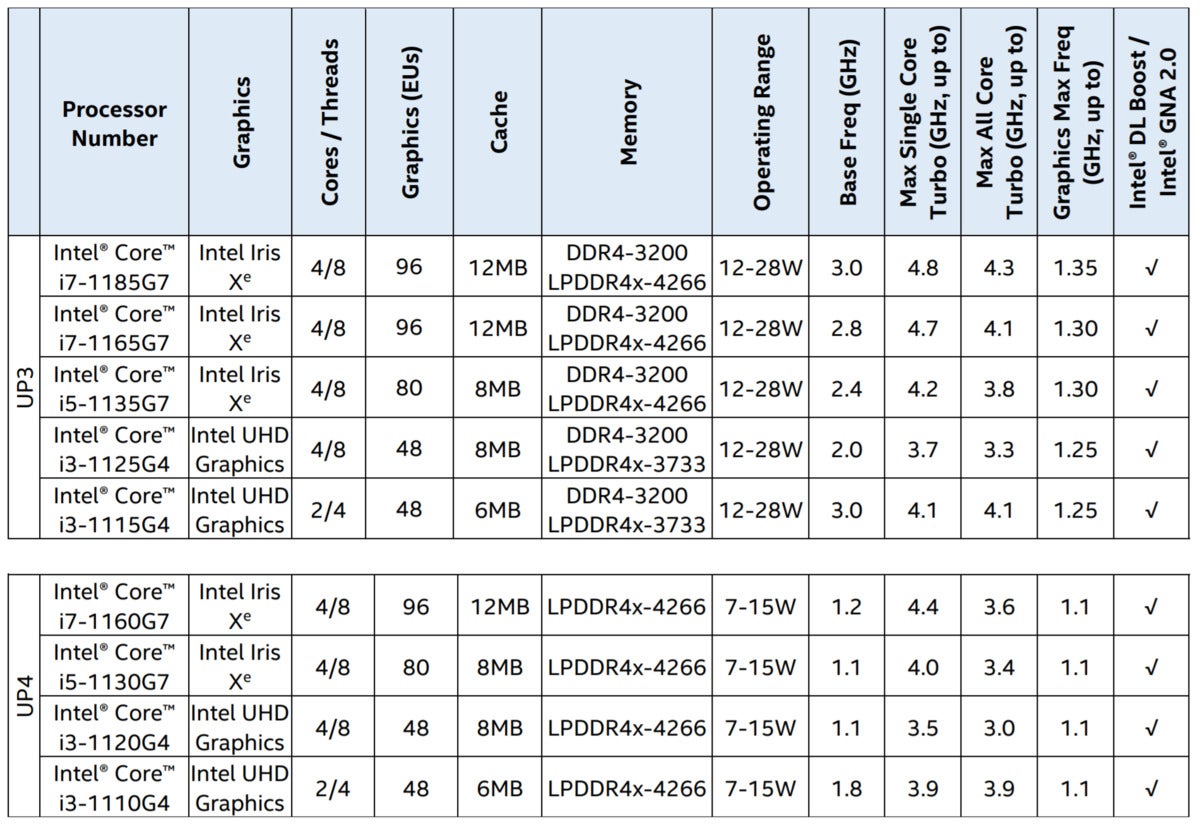
[ad_1]
Intel has quietly confirmed that it will do an 8-core version of its 11th-gen Tiger Lake chip.
In a September 3 blog post on Medium noticed by Tom’s Hardware, Intel’s Boyd Phelps confirmed that in addition to the quad-core 11th-gen CPUs due in October, the company will also push out an 8-core variant.
“The Willow Cove core increases the mid-level cache to 1.25MB—up from 512KB,” Phelps wrote, on the site usually associated with 12,000-word essays on avocado toast. “We also added a 3MB non-inclusive last-level-cache (LLC) per core slice. A single core workload has access to 12MB of LLC in the 4-core die or up to 24MB in the 8-core die configuration (more detail on 8-core products at a later date).”
Intel has so far only confirmed quad-core versions using what it now calls “UP3” and “UP4” designations. How the 8-core version shakes out isn’t known. Based on the deluge of Tiger Lake laptops pushed out two weeks ago, we think the approach could be similar to AMD’s.
 Intel
IntelExpect 8-core 11th-gen Tiger Lake chips too, the company quietly confirmed.
We make that guess based on the MSI Stealth 15M gaming laptop. While most 11th-gen Tiger Lake laptops are pretty conventional 3-pound, thin-and-light laptops with integrated graphics or even Intel’s GeForce MX450, the Stealth 15M features a GeForce RTX 2060 Max-Q paired with an 11th-gen Tiger Lake CPU.
With Tiger Lake supposedly able to push 4.8GHz on single-threaded tasks and 4.3GHz with all cores lit up, the Stealth 15M could very well be competitive with Intel’s older 10th-gen, 14nm chips in many games. That also hints at the much improved thermal and processing performance of the CPU.
Intel bifurcates its chips into 15-watt U-class CPUs with up to 4 cores for most of the series, and 45-watt H-class CPUs with up to 8 cores. Both series of chips are distinctly different in capabilities and thermal needs.
AMD also has low- and high-power designations for its chips, but they’re actually the same CPUs, just tuned down for the lower thermal dissipation of a small laptop or tuned up for a thicker, larger laptop. This gives AMD an advantage in multi-core performance, with even thin-and-light laptops like Lenovo’s Slim 7 capable of featuring an 8-core chip in it.
With Tiger Lake’s improved thermals and performance, we’d think Intel may be eyeing the same approach by scaling it from thin-and-light up to gaming laptops.
Despite Intel’s emphasis on clock speed and new instruction sets, plus its Xe graphics, Intel still needs to be competitive in core count. At least we think so, because we doubt it will have the muscle to beat AMD’s 8-core chips in multi-threaded workloads. An 8-core Tiger Lake chip would possibly deliver the punch Intel needs in that one area.
[ad_2]
Source link